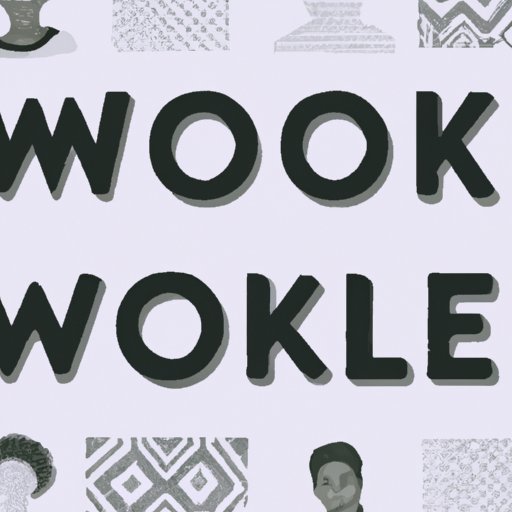Introduction
Woke culture is a term that has been used in recent years to refer to a social and political movement aimed at raising awareness of issues such as racism, sexism, homophobia, and other forms of discrimination. The term is used to describe those who are actively engaged in advocating for social justice and equality. In this article, we will explore what is woke culture, its origins, meanings, and its impact on society.
An In-Depth Look at the Meaning of “Woke Culture”
The term “woke culture” is a relatively new phrase that has gained prominence in recent years. It is used to describe a social and political movement that seeks to challenge discrimination and injustice in society. The term has come to signify individuals who are actively involved in advocating for social justice and equality.
Exploring the Origins of the Term “Woke”
The exact origin of the term “woke” is difficult to pinpoint, but it appears to have originated in the African American community. In particular, the term “stay woke” has been used since the 1960s to encourage people to remain vigilant and aware of the injustices faced by minority groups. In recent years, the term has become more widely used, with many individuals using it to signify their commitment to fighting for social justice.
Identifying the Core Beliefs of Woke Culture
At its core, woke culture is about recognizing and challenging discrimination and oppression. It is about understanding that all humans should be treated equally and that everyone has the right to be heard and respected. This includes understanding the history of oppression and the current systems of inequality that exist in society, and actively working to address these issues. Additionally, woke culture encourages individuals to be open-minded and accepting of different cultures and beliefs.

Exploring Woke: A Definition and Exploration of Woke Culture
Woke culture can be seen as a modern expression of the civil rights movement. It is a movement that seeks to challenge discrimination and inequality in all its forms. Woke culture is also about creating an inclusive and equitable society in which everyone is respected and accepted regardless of race, gender, sexuality, religion, or any other factor.
Examining the Political and Social Implications of Woke Culture
The emergence of woke culture has had significant implications for both politics and society. It has encouraged individuals to take a stand against discrimination and injustice in all its forms. Woke culture has also helped to raise awareness of issues such as racism, sexism, homophobia, and other forms of discrimination, and has helped to create a more inclusive and just society.
What Does it Mean to be “Woke”?
To be “woke” is to be aware of and actively engaged in the fight for social justice and equality. It is to recognize and challenge discrimination and oppression in all its forms. It is to strive for an inclusive and equitable society in which everyone is respected and accepted regardless of race, gender, sexuality, religion, or any other factor.
What is Woke Culture? Examining the Roots and Evolution of the Movement
Woke culture has its roots in the civil rights movement of the 1960s. Since then, the movement has evolved and grown to encompass a variety of causes related to social justice and equality. Today, woke culture is a powerful force for good, and its influence is felt in many aspects of society.
Tracing the Historical Development of Woke Culture
The term “woke” first appeared in the African American community during the 1960s. At this time, the term was used to encourage people to remain vigilant and aware of the injustices faced by minority groups. In the years since, the term has grown in popularity and has become a rallying cry for those seeking to challenge discrimination and oppression in all its forms.
Understanding the Modern Expression of Woke Culture
Today, woke culture is about understanding and challenging inequity and injustice, and striving for an inclusive and equitable society. It is about recognizing the privilege and power dynamics that exist in society, and working to create a more just and equal world. Woke culture is also about understanding the complex ways in which racism, sexism, homophobia, and other forms of discrimination manifest in our lives, and actively working to combat them.
Decoding the Language of Woke: Understanding the Terminology of the Movement
In addition to its core beliefs, woke culture also has its own unique language. This language is used to communicate the values and beliefs of the movement, and to help foster understanding and acceptance of its principles. Here, we will explore some of the key terms used in woke culture.
Defining Key Terms Used in Woke Culture
One of the most commonly used terms in woke culture is “ally.” An ally is someone who stands in solidarity with marginalized groups and works to support them in their struggle. Other common terms include “intersectionality,” which refers to the interconnectedness of different forms of oppression; “privilege,” which refers to the advantages that certain groups have over others; and “microaggressions,” which are subtle forms of prejudice and discrimination.
Exploring the Impact of Woke Terminology on Society
The language of woke culture has had a significant impact on society. It has helped to raise awareness of the struggles faced by marginalized groups, and has encouraged individuals to take a stand against discrimination and oppression. Through its language, woke culture has also helped to create a more inclusive and equitable society.

Defining Woke: A Comprehensive Overview of the Culture and Its Core Beliefs
Woke culture is a social and political movement that seeks to challenge discrimination and oppression in all its forms. It is a movement that recognizes the privilege and power dynamics that exist in society, and works towards creating an inclusive and equitable society in which everyone is respected and accepted. Here, we will explore the key principles of woke culture.
Examining the Principles of Woke Culture
At its core, woke culture is about standing in solidarity with marginalized groups and actively challenging discrimination and oppression. Additionally, it is about recognizing the complexity of the systems of privilege and oppression that exist in society, and working to create a more just and equal world. Finally, woke culture is about understanding that everyone has the right to be heard and respected, regardless of race, gender, sexuality, religion, or any other factor.
Understanding How Woke Culture Has Evolved Over Time
Since its emergence in the 1960s, woke culture has evolved and grown to encompass a variety of causes related to social justice and equality. Today, the movement has a global reach, and its influence is felt in many aspects of society. Woke culture has also helped to create a more inclusive and equitable society, and has encouraged individuals to take a stand against discrimination and oppression.
Conclusion
Woke culture is a social and political movement that seeks to challenge discrimination and oppression in all its forms. It is a movement that recognizes the privilege and power dynamics that exist in society, and works towards creating an inclusive and equitable society in which everyone is respected and accepted. Through its language, beliefs, and actions, woke culture has had a significant impact on society, and has helped to create a more just and equal world.
Summary of Woke Culture
Woke culture is a social and political movement that seeks to challenge discrimination and oppression in all its forms. It is a movement that recognizes the privilege and power dynamics that exist in society, and works towards creating an inclusive and equitable society in which everyone is respected and accepted. Woke culture also has its own unique language, which is used to communicate the values and beliefs of the movement, and to help foster understanding and acceptance of its principles.
Final Thoughts
Woke culture has had a profound impact on society, and its influence continues to grow. As we continue to strive for a more just and equitable world, it is important to understand the principles of woke culture, and to use its language and beliefs to create a more inclusive and accepting society.
(Note: Is this article not meeting your expectations? Do you have knowledge or insights to share? Unlock new opportunities and expand your reach by joining our authors team. Click Registration to join us and share your expertise with our readers.)
